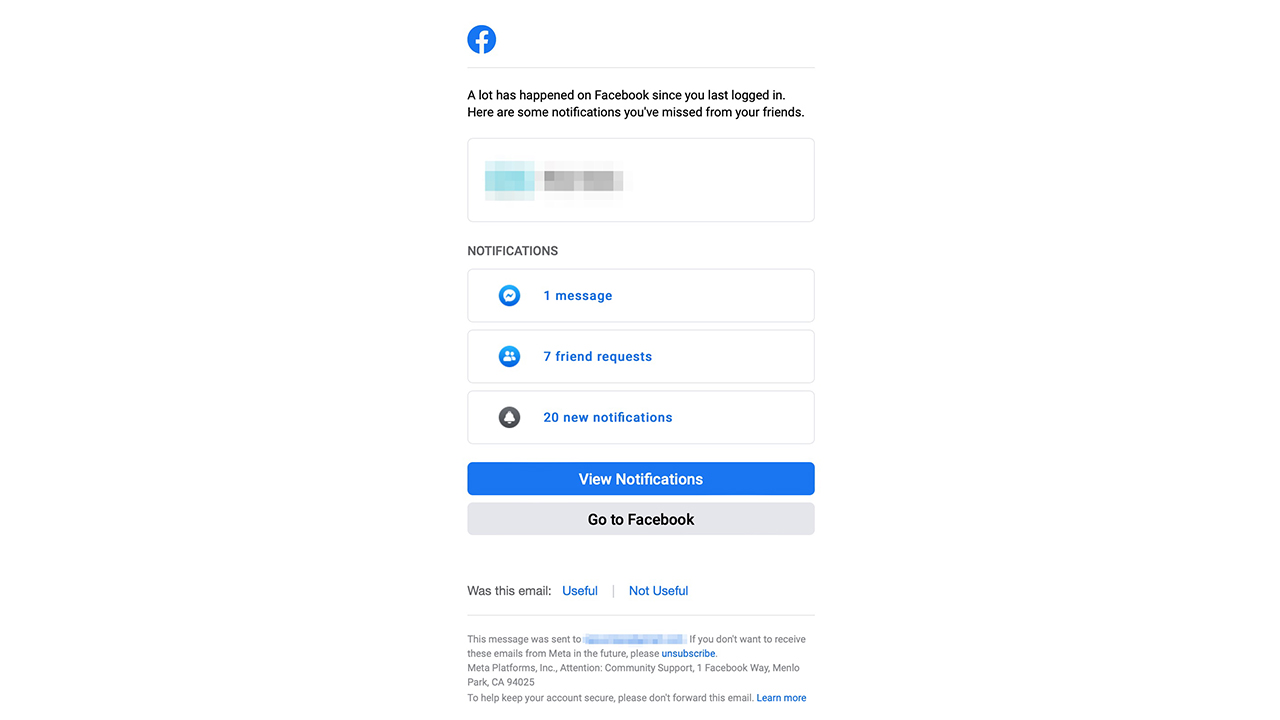Email scams have become increasingly sophisticated, making it even that much more important for you to stay vigilant and cautious when interacting with your inbox. CyberGuy Report newsletter subscriber Ken from Battle Creek, Michigan, shares his encounter with a phishing email scam.
I keep getting these messages from Facebook, “A lot has happened since the last visit. You have 3 notifications, sign in to view.” I never sign in through an email, I get on my laptop and go into Facebook and well, I have no notification to see. My rule is to never sign in through an email. If you do, you should be safe. Always go to the main website to check for any information on emails or purchases you made, not because an email says you bought something, which I get many of those also. Or they want you to call a number to dispute the charges.
– Ken, Battle Creek, MI
If you ever get an email similar to what Ken describes above, you should certainly proceed with caution because although they sometimes turn out to be legit, they can also be easily mimicked by a scammer. It’s best that you don’t click that email which may lead you to a page that looks like Facebook. Instead, go to the Facebook homepage on a browser or your app and log in there with your username and password.
Let’s go over what to avoid in a phishing email and how you can further protect yourself.

Why shouldn’t I fully trust a social media notification via email?
Many of us have social media accounts through platforms like Facebook, Twitter, Instagram, Threads and others. When you’re logged onto these sites, you typically receive notifications within the app or website whenever you get updates such as new followers, likes on posts, and more. While these notifications are primarily delivered through the app or website, some platforms may also offer the option to receive email notifications for certain activities or events. Scammers know this and will sometimes send out emails that look like official email notifications.
 MORE: DESPERATELY NEED FACEBOOK HELP? DON’T FALL FOR THIS SCAM
MORE: DESPERATELY NEED FACEBOOK HELP? DON’T FALL FOR THIS SCAM
What steps can I take to avoid and protect myself from these phishing scams?
We cannot completely stop scammers from sending us these emails. However, there are certain steps we can take and services we can use that can warn us when we’re faced with a scam. Here are some of my suggestions.
Enable spam filters
Most email service providers offer built-in spam filters that automatically detect and divert suspicious emails into the spam or junk folder. Make sure to enable these filters to reduce the number of scam emails that reach your inbox. Here are some of my tips to outsmart spammers and end unsolicited emails.
Verify email addresses and domains
Scammers often use email addresses that mimic legitimate companies or organizations like Facebook. Double-check the sender’s email address and verify the domain to ensure it matches the official website or known contact details of the company or individual.
Be wary of urgent requests
Scammers often create a sense of urgency to trick you into taking immediate action. Beware of emails claiming you’ve received a notification that you’ve won a prize, have an unpaid bill, or need to provide personal information urgently. Take a moment to verify the authenticity of such requests before responding or providing any sensitive information.
Activate Two-Step Verification
Securing your accounts using Two-Step Verification (also known as Two-Factor Authentication or 2FA) is an effective way to add an extra layer of security to your account.
MORE: FOOLPROOF STEPS TO HELP PROTECT YOUR FACEBOOK ACCOUNT FROM HACKERS
Regularly check your credit and banking accounts
Some of us might use Facebook to pay for things via Meta Pay, which requires you to have a debit or credit card connected to your account. Although this is a convenient feature, it can also put you at risk of having your banking information compromised.
Make sure you’re regularly checking your bank and credit card accounts so that you can catch any false transactions quickly and notify your bank or credit card company. A phishing email scam might try to convince you that you have charges you need to pay or that your credit or debit card was used for something, so you should check the source first before trusting a random email message.
FOR MORE OF MY SECURITY ALERTS, SUBSCRIBE TO MY FREE CYBERGUY REPORT NEWSLETTER HERE
 MORE: WARNING OVER NEW EMAIL SCAMS TARGETING FACEBOOK, APPLE USERS
MORE: WARNING OVER NEW EMAIL SCAMS TARGETING FACEBOOK, APPLE USERS
Have antivirus software actively running on all your devices
The best way to protect yourself from having your data breached is to have antivirus protection installed on all your devices. Keeping hackers out of your devices can be prevented if you have good antivirus software installed. Having antivirus software on your devices will make sure you are stopped from clicking on any potential malicious links which may install malware on your devices, allowing hackers to gain access to your personal information.
Special for CyberGuy Readers: My #1 pick is TotalAV, and you can get a limited-time deal for CyberGuy readers: $19 your first year (80% off) for the TotalAV Antivirus Pro package.
Find my review of Best Antivirus Protection here.
Report phishing attempts
If you receive a phishing email, report it to your email service provider. Most providers have mechanisms in place to identify and block malicious senders. Additionally, you can also report phishing attempts to organizations like the Anti-Phishing Working Group (APWG) or the Internet Crime Complaint Center (IC3).
Kurt’s key takeaways
Email scams have sadly become increasingly sophisticated, requiring you to remain even more vigilant and cautious. It is essential to avoid logging in through email notifications and instead visit the official website or app to check for notifications. Implementing measures such as enabling spam filters, verifying email addresses, being wary of urgent requests, using a secure password manager, regularly checking credit and banking accounts, having antivirus software on all devices, and reporting phishing attempts can further protect against scams. Stay proactive in safeguarding your online security.
Have you received any suspicious emails claiming to be from Facebook or another social media site? How does it make you feel about the security of your accounts? Let us know by commenting below.
FOR MORE OF MY SECURITY ALERTS, SUBSCRIBE TO MY FREE CYBERGUY REPORT NEWSLETTER HERE
Related:
- Desperately need Facebook help? Don’t fall for this scam
- Warning over new email scams targeting Facebook, Apple users
- Foolproof steps to help protect your Facebook account from hackers
- Don’t fall for that ‘look who died’ Facebook message trap
🛍️ SHOPPING GUIDES:
KIDS | MEN | WOMEN | TEENS | PETS |
FOR THOSE WHO LOVE:
COOKING | COFFEE | TOOLS | TRAVEL | WINE |
DEVICES:
LAPTOPS | TABLETS | PRINTERS | DESKTOPS | MONITORS | EARBUDS | HEADPHONES | KINDLES | SOUNDBARS | KINDLES | DRONES |
ACCESSORIES:
CAR | KITCHEN | LAPTOP | KEYBOARDS | PHONE | TRAVEL | KEEP IT COZY |
PERSONAL GIFTS:
PHOTOBOOKS | DIGITAL PHOTO FRAMES |
SECURITY
ANTIVIRUS | VPN | SECURE EMAIL |
CAN'T GO WRONG WITH THESE:



